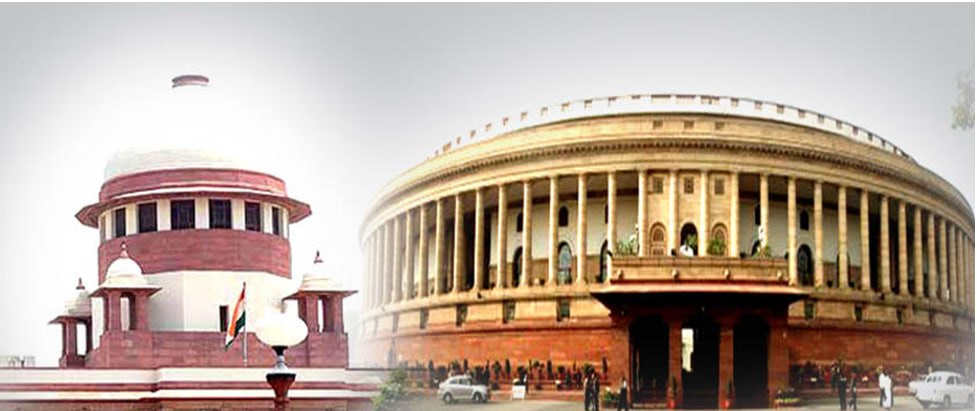Description

Copyright infringement not intended
Context: A Member of Parliament (MP) was found guilty in a defamation case and given a two-year prison sentence by a Surat district court.
Details
- A Member of Parliament who is found guilty of any crime and receives a term of at least two years is automatically disqualified from holding public office, according to Section 8(3) of the Representation of the People (RP) Act 1951, which governs a legislator's removal from office.
- The Supreme Court's ruling in the Lok Prahari case from 2018 is also underlined by experts. The ruling stated that if the conviction is suspended on appeal, the disqualification will also remain suspended.
- Constitutional law expert P.D.T. Achary claims that because the court stayed the MP sentence for 30 days, the disqualification process is also on hold for the same period. The disqualification is closely related to the sentence's severity, he claims.
- According to the RP Act and its interpretation by the Supreme Court in the Lily Thomas case, the disqualification is automatic because the court postponed the punishment rather than the conviction, claims former Chief Election Commissioner S.Y. Quereshi.
.jpeg)
Lily Thomas case
- In the Lily Thomas case (2013), the Supreme Court dismissed Section 8(4) of the RP Act, which allowed a legislator who had been convicted of an offence to continue serving on the basis that an appeal had been submitted within three months of the conviction.
What next in the Present case?
- The disqualification would not become official until the Lok Sabha Secretariat published a notification announcing the vacant seat, and the Election Commission (EC) then ordered new elections to fill the seat.
- According to sources within the Lok Sabha secretariat, there are currently no plans to declare the MP seat vacant and they are awaiting a formal complaint.
- The secretariat is proceeding cautiously in light of the recent case involving a Lakshwadeep MP.
- In January 2023, an MP was charged and convicted by a Lakshadweep court, but a week later, the Kerala High Court suspended the verdict and declared the MP's suspension from the Lok Parliament no longer applicable.
- The Election Commission's decision to declare byelections in his constituency was immediately challenged in the Supreme Court, and the court requested that the EC decision be withdrawn.
Options available with the MP
- To suspend the disqualification order, the MP needs to get his conviction stayed by a higher court.
- The MP can also approach the President as a different alternative. According to Mr Achary, the President would decide whether to disqualify an MP based on the provisions of Article 103 of the Constitution after consulting with the Election Commission.

Defamation
- A person's reputation is damaged when false comments about them are spread about them, according to the dictionary definition of defamation.
- Defamation is the purposeful, intentional, and knowing publication or utterance of a false and untrue statement with the intent to harm another person's reputation.
- A man's reputation is considered to be his property, and any damage to it is illegal. It could be spoken or written. Libel refers to defamatory written, printed, or typed content or images, whereas slander refers to defamatory spoken language.
Defamation Law in India
- The Constitution's Article 19 grants its citizens several liberties. Yet, the reasonable exemption to the freedom of speech and expression guaranteed by Article 19(1) has been imposed by Article 19(2). Among the exceptions include contempt of court, defamation, and incitement to commit a crime.
- Defamation is an offence under both civil and criminal law.
- In civil law, defamation is penalised under the Law of Torts by imposing a penalty in the form of damages to be granted to the claimant.
- Defamation is a compoundable, non-cognizable, and bailable offence under the criminal code. So, a police officer may only arrest with a warrant that has been issued by a magistrate. According to the Indian Penal code, the offence is punishable by a simple jail term of up to two years, a fine, or both.
Disqualification of Legislature: https://www.iasgyan.in/daily-current-affairs/disqualification-of-legislators
Disqualification under Anti-Defection law: https://www.iasgyan.in/daily-current-affairs/anti-defection-law-34
Disqualification under the office of Profit:
https://www.iasgyan.in/daily-current-affairs/office-of-profit
|
PRACTICE QUESTION
Q. Consider the following Statement;
1. A nominated legislator is prohibited from joining a political party within six months after their appointment to the House.
2. The legislation makes no mention of a deadline by which the presiding officer must decide a defection case.
Which of the following Statement is/are correct?
(A) 1 only
(B) 2 only
(C) Both 1 and 2
(D) Neither 1 nor 2
Answer: B
Explanation:
Statement 1 is incorrect: A nominated MP within six months of being nominated to the House can choose to join a political party. The time is given so that if a nominated MP is not a member of a political party, they can decide to join one if they want. But if they don’t join a political party during the first six months of their tenure, and join a party thereafter, then they lose their seat in Parliament.
Statement 2 is correct: The House's presiding officer will decide on any disqualification issue resulting from a defection. The Presiding Officers are not given a time limit by law to consider a disqualification plea. The petitioner has no choice but to wait until the officer has decided since the courts can only get involved after the officer has made a decision.
|

https://epaper.thehindu.com/ccidist-ws/th/th_delhi/issues/29780/OPS/GN3B1C81N.1.png?cropFromPage=true













